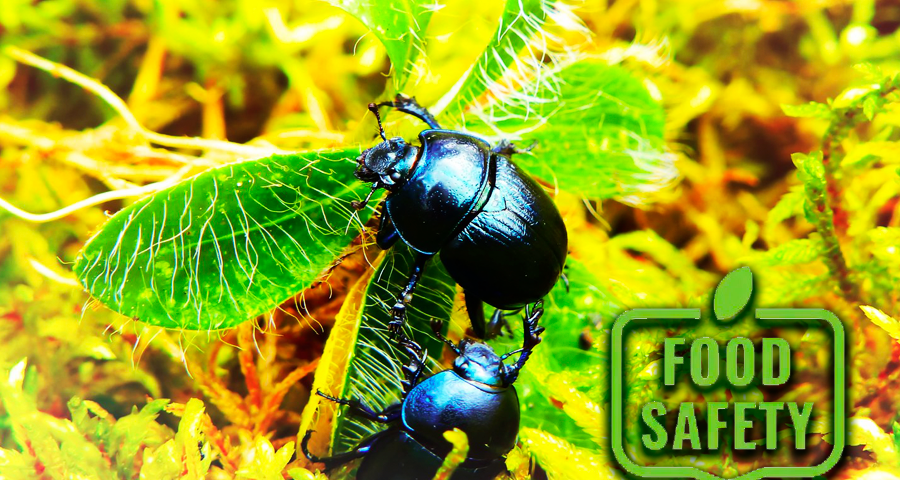Suppressing Pathogens on Farms, Naturally

It may seem contradictory, but dung beetles and soil bacteria may be better natural suppressants of harmful human pathogens than removing hedgerows, ponds, and other habitats to keep out wild animals on farms, new research found.
Dung beetles and soil bacteria at farms naturally suppress E. coli and other harmful pathogens before they spread to humans, acting as an early link in the food safety chain.
The research appeared in the March 18 issue of the Journal of Applied Ecology.
“We feel that dung beetles and beneficial soil bacteria are another tool in the food safety toolbox, and that they are another benefit of organic agriculture,” says Matthew Jones, PhD, an author of the study and a research faculty member at the Washington State University (WSU) Tree Fruit Research and Extension Center in Wenatchee, Wash.
“Reduced use of broad-spectrum insecticides and wormicides have been found to encourage dung beetle populations,” says Dr. Jones, who led the research as part of his PhD project at WSU.
The study examined two novel pathways through which organic farm management may contribute to an environment that better suppresses pathogens.
First, organic farms tend to build more organic matter in their soils. The organic matter promotes diverse microbial communities, which suppress foodborne pathogens.
Second, organic farms host diverse dung beetle assemblages that are effective at burying dung and removing foodborne pathogens.
“Promoting dung beetle diversity and soil microbial diversity by building organic matter represents a powerful path forward for suppressing foodborne pathogens in soils,” says Daniel S. Karp, PhD, an assistant professor at the University of California, Davis, who co-authored the study.
Food safety regulations are increasingly pressuring growers to remove the hedgerows and other natural habitats that farms use to keep out pathogen-carrying wildlife like wild pigs and livestock.
But removing habitats could decrease biodiversity and make the farmland less hospitable to pollinators and other beneficial insects or birds, the researchers found.
Dung beetles bury feces below ground and make it difficult for pathogens to survive.To study how this may aid in food safety, Dr. Jones drove a van full of pig feces along the U.S. West Coast, following the planting of broccoli at 70 farm fields during the growing season. Broccoli, much like leafy greens, is susceptible to fecal contamination due to its proximity to the ground and the likelihood that humans will not cook it before eating.
The pig feces were used to attract dung beetles and see how quickly they would clean up the soil. The experiment was carried out at conventional and organic farms, and farms with or without livestock.
Organic farms seemed to attract a diverse range of dung beetle species. They were the most effective at keeping foodborne pathogens at bay.
“We found that organic farms generally fostered dung beetle species that removed the feces more rapidly than was seen on conventional farms,” says William Snyder, PhD, a co-author. Dr. Snyder was at WSU when the study was completed but has since moved to the University of Georgia.
“Our study suggests that farms have a natural cleanup crew of beneficial dung beetles and bacteria that may be the best defense against food safety problems,” he notes.
“Organic farms, in particular, seem to be attractive places for these helpful creatures to live,” Dr. Snyder adds. “So, it looks like discouraging biodiversity on the farm, as some food safety management plans suggest, will be counterproductive. Instead, growers might be wise to encourage the dung beetles and soil bacteria that help keep harmful bacteria in check.”
Dung beetles likely kill harmful bacteria both when they consume and bury the feces.
“They’re decomposers, utilizing animal waste as sustenance. Truly remarkable little beings,” says Dr. Jones.
He says the mechanism by which dung beetles kill pathogenic E. coli in manure is still poorly understood, but it could be a combination of directly killing E. coli through mastication and by simply aerating manure and creating a less hospitable environment for the bacterium to survive.
Dr. Jones also notes that a group in Korea also found antimicrobial properties built into the exoskeleton of a different species.
To validate their findings, the researchers exposed the three most common species of dung beetles found in the field survey to pig feces contaminated with E. coli. A seven-day laboratory experiment revealed that Onthophagus taurus and Onthophagus nuchicornis reduced E. coli numbers by more than 90 percent and less than 50 percent, respectively.
They also found that organic farming encouraged higher biodiversity among soil bacteria, which decreased the survival of pathogens.
“Wildlife and livestock are often seen as something that endanger food safety, but our research shows that reducing on-farm biodiversity might be totally counterproductive,” says Dr. Jones.
He says he sees no real challenges in allowing dung beetles to persist on farms. The dung beetles are naturally occurring, not purchased.
Dr. Jones says a lot of assumptions are made when putting food safety regulations on farmers without thoroughly researching the indirect effects of these regulations.
“There’s a lot more to be done regarding the co-management of food safety and conservation,” he says.
One farmer who has noticed a benefit from having dung beetles is Judith Redmond, co-owner of Full Belly Farm, Guinda, Calif., located in the northern part of the state.
“Our farm has been managed organically since 1985,” says Redmond. The 400-acre certified organic farm with 80 different crops as well as chickens, sheep, goats, and cows.
“I would expect that we have had the dung beetles for several decades at least,” she says. “The benefits, as described in the research, are that they contribute to breaking down organic materials and even possibly to reducing food safety risks.”
Source: https://www.foodqualityandsafety.com


